Seed-to-Sale Tracking Compliance By State
Every year in the United States, more and more states are ending their local marijuana prohibitions. However, because marijuana is still illegal on a federal level, states require businesses to have extensive record-keeping and reporting.
All licensed recreational cannabis establishments must use a seed-to-sale tracking system to stay legal. Also called “track-and-trace programs,” these systems track the cannabis life cycle from seed germination to the final product sales, ensuring businesses comply with state regulations.
Here’s a map showing which seed-to-sale systems each state requires:
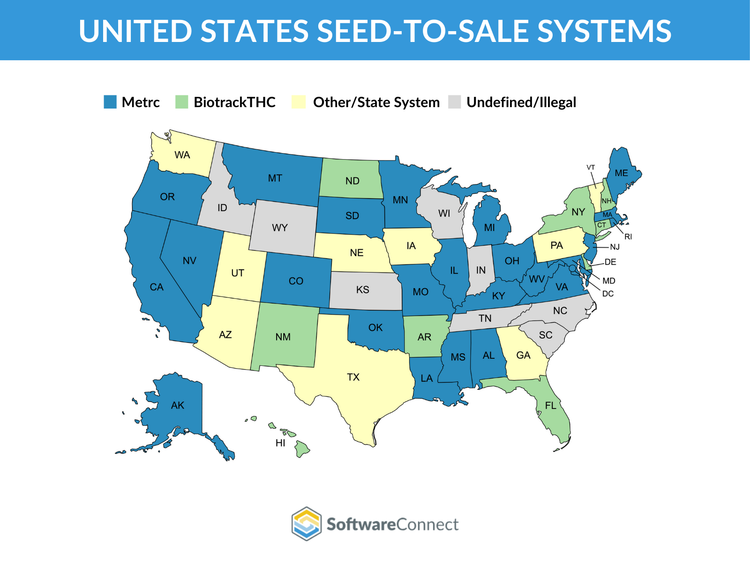
Software Compliance by State
Each state with legal medical or adult-use marijuana has a contracted software system it must use to monitor compliance of all marijuana establishments in the state. The table below contains the link for each state’s cannabis regulatory agency, each state’s legal status, and the seed-to-sale software currently contracted with the state.
| State/Territory | Legal Status | Software |
|---|---|---|
| Alabama | Medical | Metrc |
| Alaska | Medical & Recreational | Metrc |
| Arizona | Medical & Recreational | No Requirement |
| Arkansas | Medical | BioTrack (BT Government) |
| California | Medical & Recreational | Metrc |
| Colorado | Medical & Recreational | Metrc |
| Connecticut | Medical & Recreational | BioTrack (BT Government) |
| Delaware | Medical & Recreational | BioTrack (BT Government) |
| District of Columbia | Medical | Metrc |
| Florida | Medical | BioTrack (BT Government) |
| Georgia | Medical (Low THC) | No Requirement |
| Guam | Medical & Recreational | Metrc |
| Hawaii | Medical | BioTrack (BT Government) |
| Idaho | Illegal | |
| Illinois | Medical & Recreational | Metrc |
| Indiana | Illegal | |
| Iowa | Medical | BioMauris |
| Kansas | Illegal | |
| Kentucky | Medical | Metrc |
| Louisiana | Medical | Metrc |
| Maine | Medical & Recreational | Metrc |
| Maryland | Medical & Recreational | Metrc |
| Massachusetts | Medical & Recreational | Metrc |
| Michigan | Medical & Recreational | Metrc |
| Minnesota | Medical & Recreational | Metrc |
| Mississippi | Medical | Metrc |
| Missouri | Medical & Recreational | Metrc |
| Montana | Medical & Recreational | Metrc |
| Nebraska | Medical | No Contracted System |
| Nevada | Medical & Recreational | Metrc |
| New Hampshire | Medical | BioTrack (BT Government) |
| New Jersey | Medical & Recreational | Metrc |
| New Mexico | Medical & Recreational | BioTrack (BT Government) |
| New York | Medical & Recreational | BioTrack (BT Government) |
| North Carolina | Illegal | |
| North Dakota | Medical | BioTrack (BT Government) |
| Ohio | Medical & Recreational | Metrc |
| Oklahoma | Medical | Metrc |
| Oregon | Medical & Recreational | Metrc |
| Pennsylvania | Medical | Leaf Data Systems (MJ Freeway) |
| Puerto Rico | Medical | BioTrack (BT Government) |
| Rhode Island | Medical & Recreational | Metrc |
| South Carolina | Illegal | |
| South Dakota | Medical | Metrc |
| Tennessee | Illegal | |
| Texas | Medical (Low THC) | No Requirement |
| Utah | Medical | Leaf Data Systems (MJ Freeway) |
| Vermont | Medical & Recreational | No Contract (State System) |
| Virginia | Medical | Metrc |
| Washington | Medical & Recreational | No Contract (State System) |
| West Virginia | Medical | Metrc |
| Wisconsin | Illegal | |
| Wyoming | Illegal |
What Is Seed-To-Sale Tracking?
Cannabis seed-to-sale tracking is a compliance system used in the legal medical and recreational cannabis industry to monitor plants and products throughout their entire lifecycle.
The cannabis product life cycle starts with planting, then harvesting, testing, processing, packaging, and finally selling. Marijuana plants receive an RFID or barcode tag during early growth and are tracked with this tag throughout their lifecycle. Growers refine cannabis plants to create different products, so tracking the plant from seed to final product can be complex.
Each stage of the product life cycle compiles hundreds of data points that are not only helpful for monitoring cannabis business efficiency but are mandatory for government accountability.
Marijuana operations must send data from seed-to-sale systems in daily reports to the state’s cannabis regulatory body. This government agency monitors compliance, collects taxes, verifies product quality, and ensures that every gram is fully legal at every stage of the product life cycle
Specialized seed-to-sale software can streamline this complex reporting and compliance process and make it easier to stay up-to-date with regulations. Seed-to-sale software sends data in real-time to state-contracted systems and also offers predictive analytics and tools for dispensary POS systems.
Track-and-Trace vs. Seed-to-Sale Software
State track and trace systems like Metrc or BioTrack serve one purpose: compliance. They have been designed for regulators to see where every gram goes until it’s sold. State compliance systems are not built to help companies manage their daily work. Think of it like filing your taxes; you have to do it to stay in business, but it doesn’t actually help you run your operations.
That’s why many cannabis companies use a commercial seed-to-sale software. These platforms sync with your state database so that compliance happens automatically without having to upload anything manually. This saves time and provides advanced features specific to the cannabis industry like inventory management, strain and recipe tracking, customer management, and even POS for retail dispensaries.
The Importance of Compliance for Cannabis Businesses
Because of marijuana’s federal prohibition in the United States, states require legal cannabis businesses to create and keep extensive records and reports. Therefore, maintaining compliance is a vital component of retaining cannabis business licenses and permits, without which their companies couldn’t legally function.
Compliance reporting helps state governments differentiate between legal and illegal markets and ensures that legal marijuana isn’t being sold on the black market. Also, tracking legal marijuana products helps state regulators recall unsafe products.
Without proper compliance and reporting, cannabis operations can face hefty fines and even the loss of their entire business. Since the legal cannabis industry is in its infancy, rules and regulations are constantly changing. Seed-to-sale software keeps track of these evolving regulations to help legal marijuana businesses remain compliant.
Cannabis growing operations have limits on the number of plants they can grow, and seed-to-sale systems track plants and report the numbers to state regulatory bodies.
It is important to note that every state has its own rules for cannabis cultivation, sales, and reporting methods. Check with your state’s cannabis regulatory agency to learn the required tracking systems. Find your state agency information using the compliance by state table above.
The Seed-to-Sale Software Market
As states adopt legalization for both medical and recreational marijuana, the seed-to-sale software market is growing alongside the legal cannabis market. As a result, by 2028, the global cannabis software market is on track to be worth 3,617.07 Million.
Within the 43 U.S. states and territories where cannabis is legal in some capacity, these four systems control the seed-to-sale software market: Metrc, BioTrack, Leaf Data Systems, and Trace. Metrc comes in first, holding roughly 50% of the market share. Coming in second is BioTrack with 24% of the market share, then Leaf Data Systems with 6%.
Check out some of the top seed-to-sale software systems:
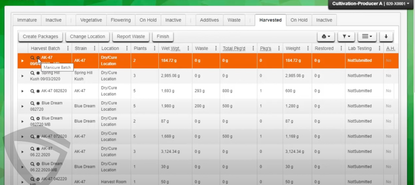
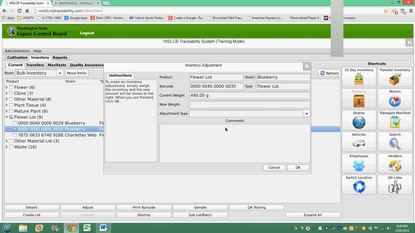
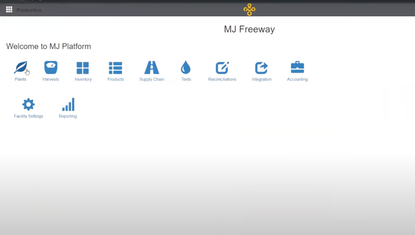
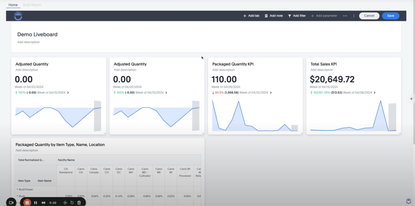
Metrc and BioTrack
In August 2025, the two biggest names in cannabis compliance announced a major partnership. BioTrack and Metrc created a new entity called BT Government, Inc., to take over BioTrack’s government-facing track and trace contracts. Metrc will continue providing state compliance systems, while BioTrack will refocus on its commercial and operations software for dispensaries and operators.
For cannabis companies operating in BioTrack (states like New York, Connecticut, and New Mexico), their regulatory reporting could shift to Metrc’s compliance software in the near future. For many operators, this means that daily workflows and integrations could change, require a system update, or mandate a new training course. On the upside, this provides less confusion for new cannabis license holders as the majority of the U.S. market will now use the same seed-to-sale software.
